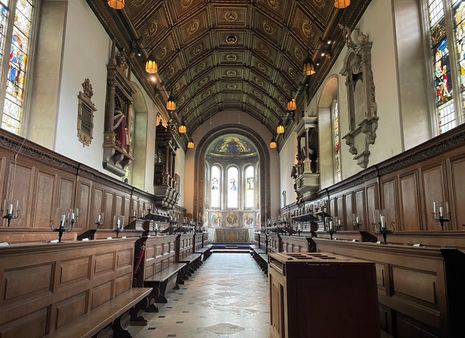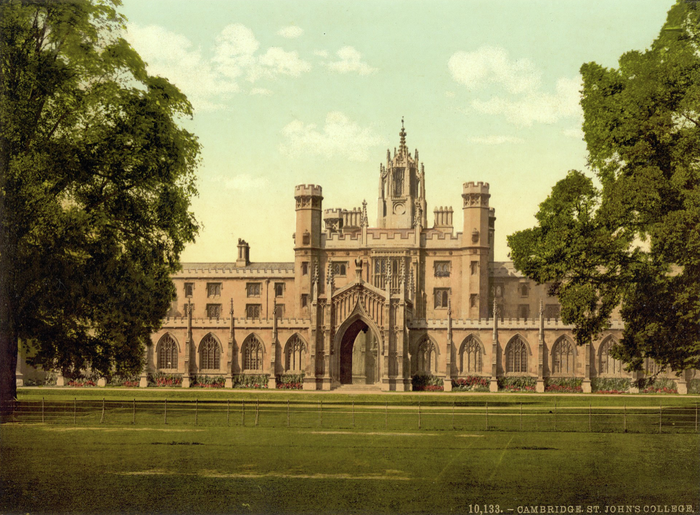Ringing the changes: the evolution of college chapels
Nick James traces the evolving role of the college chapel as the student body diversifies

Gonville & Caius College is made up of three separate courts: Tree Court, Gonville Court, and Caius Court. Each has a unique feel and function: Tree Court has spires like a castle; Gonville Court is home to the food hall and bar; and Caius Court is where Stephen Hawking’s former office resides.
Yet despite their differences, one thing unites them all: the chapel.
Lying at the heart of the College, the chapel is part of all courts: its long, narrow exterior is adorned with stained glass windows and vines creeping up some of its walls. The inside is lined with wooden pews that lead to an altar, sitting below a golden, grand mosaic. Cream paint covers the interior walls and a lofty arched roof has decorated wooden panels.
Caius Chapel has a claim to be Cambridge’s oldest purpose-built college chapel that is still in use, with the core of its walls dating back to 1390. At the time, the college community was almost entirely Christian and the chapel was constructed to give people a place to worship God.
As is the case for most chapels across Cambridge colleges, these Christian traditions have persisted for centuries. As a result, the chapel has always been a central part of a college. At Caius, it was not only a place to pray but also a place to hold college meetings and sit exams, highlighting just how intertwined Christian tradition and college life were.
Today, the culture at Cambridge colleges looks very different: it is no longer an almost entirely Christian community, but is instead home to a diverse range of faiths and beliefs.
While the University doesn’t publish data about the religious backgrounds of its students, the 2021 Census recorded that only 29% of those in Central and West Cambridge identify as Christian – one of the lowest rates in England. Furthermore, University data from 2020 to 2021 reveals that Cambridge students are nationals of 141 different countries, highlighting the institution’s increased diversity.
“The importance of spiritual well-being and looking beyond ourselves is important no matter one’s faith”
So, how are college chapels – which have been at the heart of colleges for so long – adapting to a more diverse student body?
“The role of a college chapel in 2023 is to help build community and allow all people to grow in their spiritual lives,” says Reverend Megan Daffern, the acting dean at Caius. Daffern believes it is vital that the chapel is a place where all can engage with their college, giving everyone a chance to share, reflect and listen to the same music.
The chapel also provides a space for people to grow in their spiritual lives, with Daffern telling me: “The importance of spiritual well-being and looking beyond ourselves is important no matter one’s faith. It allows us to see ourselves differently and observe the world from different perspectives.”
While an undergraduate at Exeter College, Oxford, Daffern’s own chapel was an important place for her spiritual growth. She said: “The chapel felt like a special place to me,” and was a place she used to reflect and be still. Daffern wants to ensure all Caius students have the same space to reflect as she had, no matter their faith.
To help facilitate this, Daffern has launched “After Dinner Conversations” – a scheme that encourages all people from across the Caius community to come together and discuss topics such as “Perception” and “Beauty” from their experiences and expertise with the topic. Speakers have included students, porters, fellows, and alumni who hold a variety of beliefs and faiths.
It has been very well received, giving people the chance to hear a variety of viewpoints and engage with them respectfully and thoughtfully. Daffern also emphasises that the scheme is not just about hearing others, but also encouraging people to find their voices, ensuring that the scheme helps build community as well as one’s spiritual growth.
“Talks that combine faith with modern-day problems are one good way forward”
At Corpus Christi, a different approach is being taken. The chaplain, Reverend Matt Bullimore, spoke to me about the importance of preserving the chapel’s long Christian history but said the services are designed to be hospitable and welcoming to all – whether one is Christian, looking to explore faith, or there simply to enjoy the music.
However, Bullimore stresses that while the chapel is tradition-focused, the chaplaincy is open to the whole community. As chaplain, Bullimore does everything from helping organise a 70s disco for incoming freshers, to facilitating conversations between religious groups and the community when tensions are running high. During the Covid lockdowns, he even launched a “Come Walk With Me” scheme to help people meet and get to know each other, which he highlighted as one of his greatest achievements.
At Robinson, the chapel recently ran a series of talks on “Was Jesus Woke?” – which engaged in a relevant and pertinent topic that helped appeal to a wider audience. Anika Goddard, a Jesus College student who spoke at the event said: “As the chapel changes to accommodate a more secular student body, I think there’s an important balance to be struck between maintaining the chapel as an inherently Christian space, whilst also expanding its role in the college community to make sure it keeps serving everyone. For me, talks that combine faith with modern-day problems are one good way forward.”
At Queens’ College, the dean and chaplain recently established a Faith Centre, designed to be a shared space for everyone. The space provides an alternative to the traditional chapel and includes a light and airy main room with comfortable seating, access to a private roof garden, and a kitchen with an oven reserved for kosher use.
The chaplaincy team also hosts a range of regular events in the Faith Centre, including “Book Group”, “Woolly Wednesday”, and “Tea on the Terrace”. The team told me: “We are fortunate that the Faith Centre is well supported by Queens’ and some generous alumni donors, who share our vision of a space in College where all are welcome to step aside from the surface demands of life that consume so much of our energies, and focus for a while on what truly sustains us.”
While most chapels haven’t changed physically over the past few centuries, the chaplaincy staff running them are clearly eager to adapt to the changing times. New initiatives, centres and approaches are constantly being refreshed to allow all to benefit from the community-building and spirit-growing benefits of chapels. The role of the chapel and chaplaincy teams may be evolving, but they remain at the very centre of their colleges.
 News / Cambridge students set up encampment calling for Israel divestment6 May 2024
News / Cambridge students set up encampment calling for Israel divestment6 May 2024 News / Cambridge postgrad re-elected as City councillor4 May 2024
News / Cambridge postgrad re-elected as City councillor4 May 2024 News / Some supervisors’ effective pay rate £3 below living wage, new report finds5 May 2024
News / Some supervisors’ effective pay rate £3 below living wage, new report finds5 May 2024 Fashion / Class and closeted identities: how do fits fit into our cultures?6 May 2024
Fashion / Class and closeted identities: how do fits fit into our cultures?6 May 2024 News / Academics call for Cambridge to drop investigation into ‘race realist’ fellow2 May 2024
News / Academics call for Cambridge to drop investigation into ‘race realist’ fellow2 May 2024






